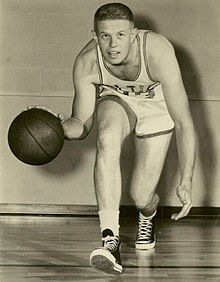Frank Ramsey (basketball)
 |
|
| Personal information | |
|---|---|
| Born |
July 13, 1931 Corydon, Kentucky |
| Nationality | American |
| Listed height | 6 ft 3 in (1.91 m) |
| Listed weight | 190 lb (86 kg) |
| Career information | |
| High school | Madisonville (Madisonville, Kentucky) |
| College | Kentucky (1950–1954) |
| NBA draft | 1953 / Round: 1 / Pick: 5th overall |
| Selected by the Boston Celtics | |
| Playing career | 1954–1964 |
| Position | Small forward / Shooting guard |
| Number | 23 |
| Career history | |
| As player: | |
| 1954–1964 | Boston Celtics |
| As coach: | |
| 1970–1971 | Kentucky Colonels |
| Career highlights and awards | |
|
|
| Career statistics | |
| Points | 8,378 (13.4 ppg) |
| Rebounds | 3,410 (5.5 rpg) |
| Assists | 1,134 (1.8 apg) |
| Stats at Basketball-Reference.com | |
| Basketball Hall of Fame as player | |
|
College Basketball Hall of Fame Inducted in 2006 |
|
Frank Vernon Ramsey, Jr. (born July 13, 1931) is an American former professional basketball player and coach. A 6-3 guard, he played his entire nine-year (1954–1964) NBA career with the Boston Celtics and played a major role in the early part of their dynasty, winning seven championships. Ramsey was also a head coach for the Kentucky Colonels of the ABA during the 1970–1971 season.
Raised in Madisonville, Kentucky, Ramsey was a multi-sport athlete at the University of Kentucky, playing baseball as well as basketball. Playing under legendary coach Adolph Rupp, Ramsey, as a sophomore in 1951, helped the Wildcats win the NCAA Championship with a 68-58 victory over Kansas State.
In the fall of 1952, a point shaving scandal involving three Kentucky players (a fourth player, Bill Spivey, a teammate of Ramsey's on the 1951 championship team, was accused of being involved in the scandal but denied the charge) over a four-year period forced Kentucky to forfeit its upcoming season, Ramsey's senior year, as well as that of Cliff Hagan and Lou Tsioropoulos. The suspension of the season made Kentucky's basketball team, in effect, the first college sports team to get the "death penalty", although it was nothing more than the NCAA asking members schools not to schedule Kentucky, and not mandating it.
...
Wikipedia
